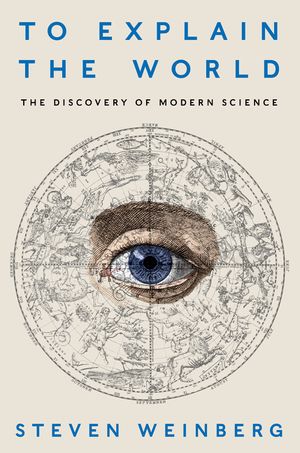Steven Weinberg - To Explain the World
Steven Weinberg 2015. To Explain the World. New York: Harper Collins, 416 pp.
 Steven Weinberg is a hard marker. A “nice try” for a historical figure (like the pre-socratics) is not good enough for him - he unashamedly adopts the “Whig view of history” and judges progress in the history of science according to whether or not discoveries were achieved by a valid scientific approach, and achieved an improvement on understanding towards current knowledge of the universe.
Steven Weinberg is a hard marker. A “nice try” for a historical figure (like the pre-socratics) is not good enough for him - he unashamedly adopts the “Whig view of history” and judges progress in the history of science according to whether or not discoveries were achieved by a valid scientific approach, and achieved an improvement on understanding towards current knowledge of the universe.
Weinberg does make one distinctly non-Whiggish concession, granting Kepler a free hit for his hypothetical spheres and regular polyhedrons to explain planetary orbits. For Kepler the planets were his whole universe, stars not being understood, so any successful explaination need only win in this limited scope. Likewise, perhaps, the current failure to unify physics and understand dark matter with an expanding universe might well also be because even now our view is way too local. (Other multiverse advocates, eg Max Tegmark, have made the same argument.)
A wonderful book which is a trajectory fspanning the pre-socratics of Miletus, the Greeks, Arabs, medieval Europe, to Copernicus and Newton. Weinberg sticks his neck out to rate the greatest scientists of history: Galileo, Newton, Darwin and Einstein. But only Galileo and Newton rate significant mention here; more recent progress being judged as minor compared with the advances wrought by the genius (and odd fish) Isaac Newton. Faraday and Maxwell and fields are skipped, and even Einstein, Dirac and others who developed the Standard Model barely rate a sentence.
Weinberg’s potted scientific biographies of Galileo and Newton, several pages each, are one of many highlights and that alone is reason enough to seek out my own copy of this book. It is very much a physicist’s view of the discovery of modern science: Darwin & Wallace, Franklin, Watson & Crick, DNA don’t exist and evolution by natural selection seems just chemistry plus common sense. Chemistry in turn is of course just emergent physics where all the true understanding is to be found. For example, and it is hard to disagree:
Any general principle of biology is what it is because of the fundamental princiles of physics together with historical accidents, which by definition can never be explained. (p. 267)
Maybe the only disappointment is that Weinberg gratuitously outs himself as a cat person, and it is true he does have that look (eyebrows?). But he can convey his deep understanding of physics and science with effortless simplicity and it is a wonderful book.


